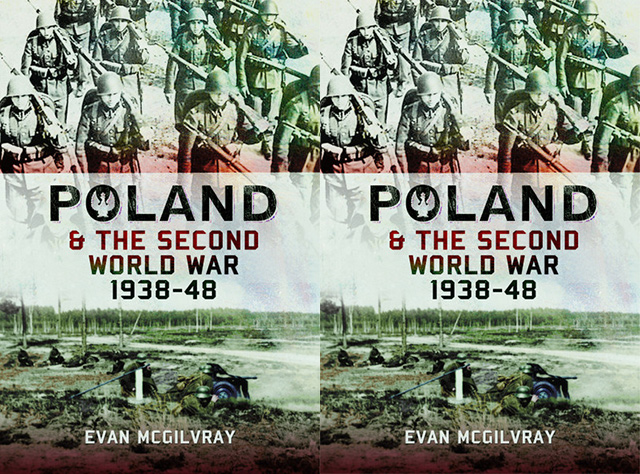Poland and the Second World War 1938-48
Book review

Poland and the Second World War 1938-48, Evan McGilvray, Pen and Sword, 2019, 344p, £25-00. ISBN 9781473834101.
For those of us who understood that the Polish Partitions of the 18th Century had removed the reality of a Polish state from the map of Europe and that at the end of the Great War Poland’s nationhood had gloriously been re-instated, Evan McGilvray provides a very different perspective.
His thesis is that an undemocratic Poland under the military leadership of Pilsudski and Smigly-Rydz managed to emerge and survive because of Soviet weakness in the early days of the Bolshevik state. Despite Polish nationalist belief in their destiny and importance, the state was vulnerable. This vulnerability was twofold. The Germans were unhappy about the status of Danzig and the separation of East Prussia from the rest of the German nation. They were intent on overturning this settlement and it is quite clear that Hitler hoped that Poland could be manoeuvred into provoking a reversal of the Versailles settlement. Latterly the Poles were aware of their predicament but did not wholly appreciate that the Russians had only accepted the emergence of an independent Poland as a temporary outcome. When the Russo-German Pact was agreed in 1939, the Russian aspiration was to overturn what they regarded as a humiliation from twenty years earlier. The upshot of this is that when the Germans were in retreat, the Russians had no intention of allowing an independent Poland to re-emerge.
McGilvray makes the point that the Poles had to wait until 1989 for their opportunity to regain their independent statehood. His interpretation of what has happened, however, is very poignant. He sees the Polish political leadership edging towards a similar political posture to that of Pilsudski and Smigly-Rydz in the inter-war years, edging towards authoritarianism. He sees this in a context where those who contend for leadership in Poland are not really connected to the values and lives of ordinary people, like their forbears, and that this creates vulnerability.
Evan McGilvray makes very good use of documentary sources, both British and Polish, and this provides a very strong foundation for his interpretation. This latter may be rather stark but it does provide a sound footing for a debate about what we see happening in modern-day Poland.

